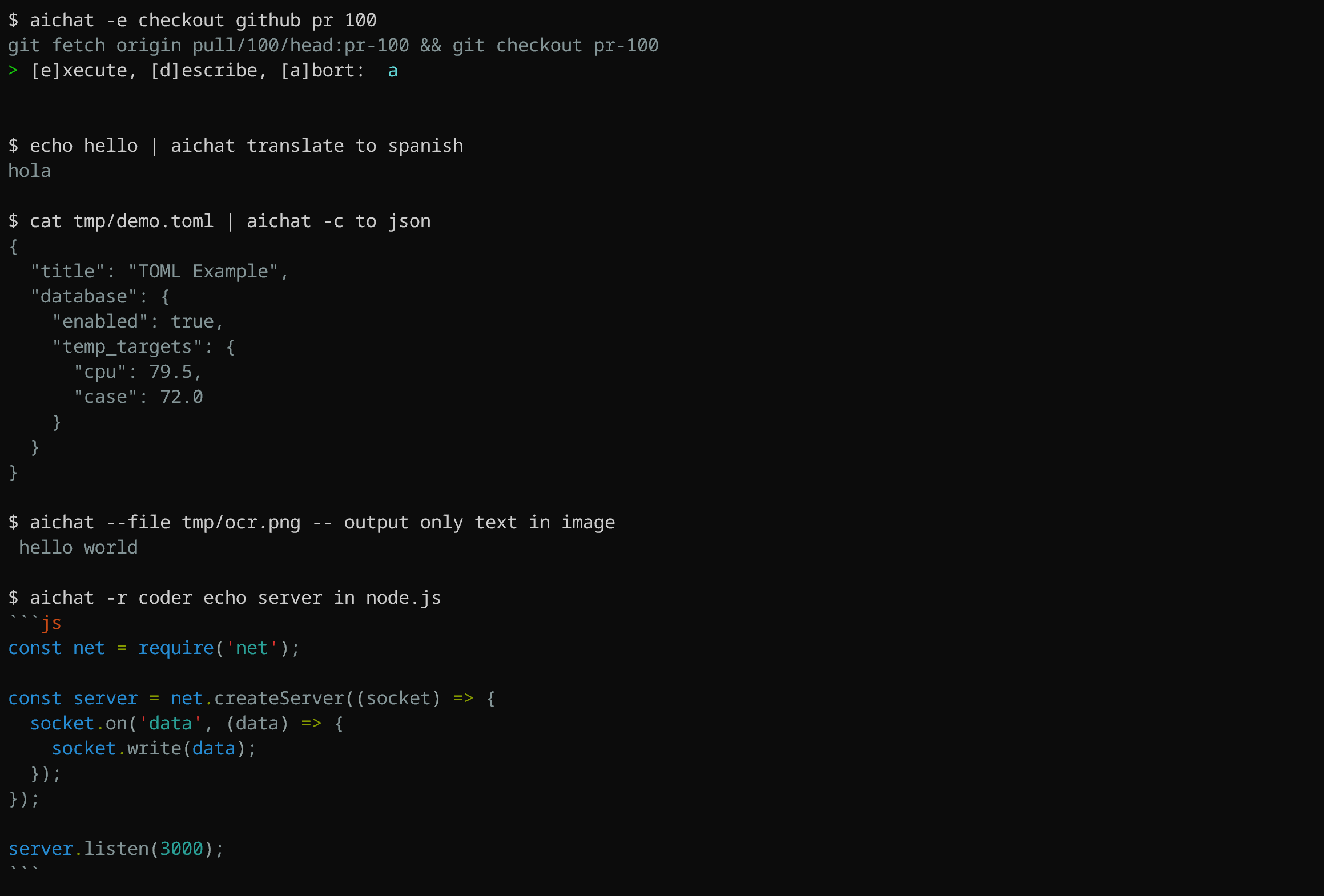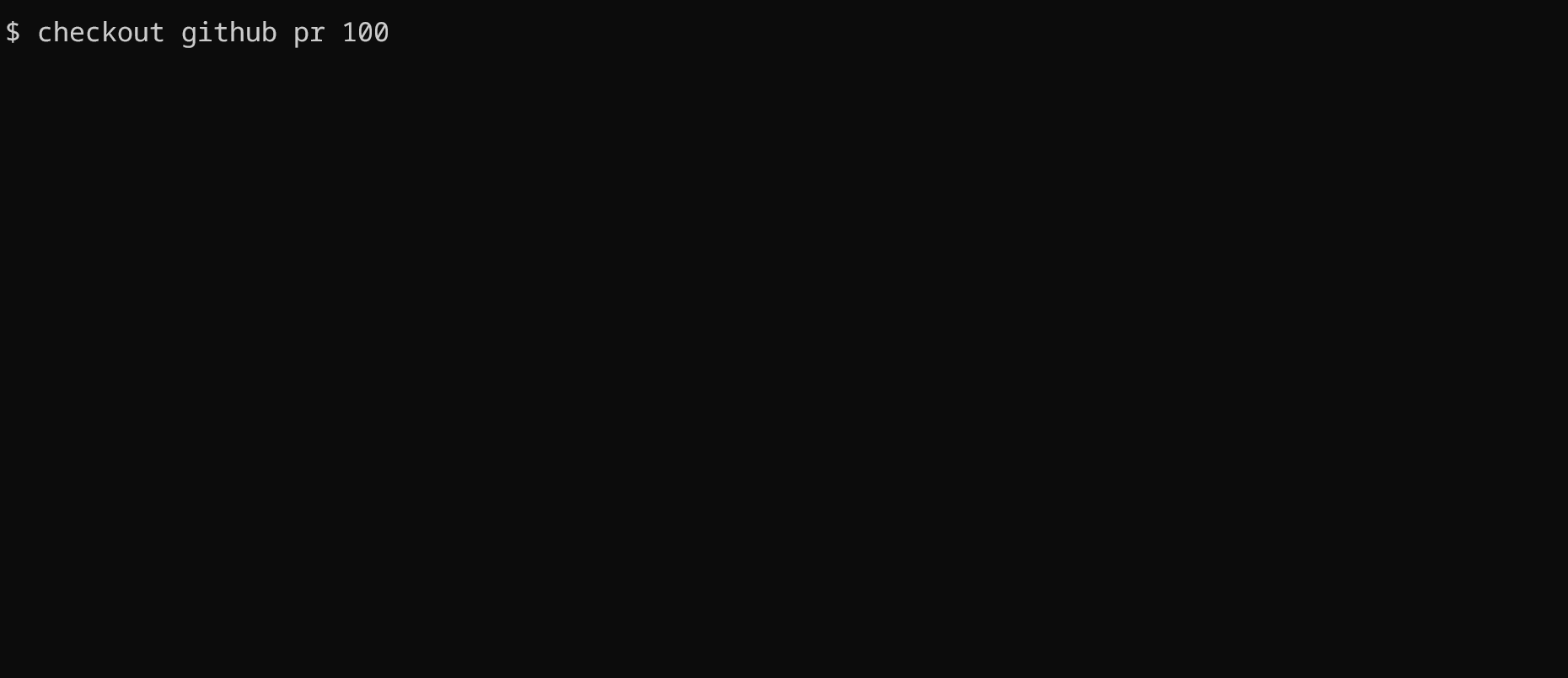mirror of
https://github.com/sigoden/aichat
synced 2024-11-08 13:10:28 +00:00
438 lines
12 KiB
Markdown
438 lines
12 KiB
Markdown
# AIChat
|
||
|
||
[](https://github.com/sigoden/aichat/actions/workflows/ci.yaml)
|
||
[](https://crates.io/crates/aichat)
|
||
|
||
All-in-one CLI tool for 10+ AI platforms, including OpenAI, Gemini, Claude, Mistral, Ollama, VertexAI, Ernie, Qianwen, Moonshot...
|
||
|
||
Command Mode:
|
||
|
||

|
||
|
||
Chat REPL mode:
|
||
|
||

|
||
|
||
## Install
|
||
|
||
### Use a package management tool
|
||
|
||
For Rust programmer
|
||
```sh
|
||
cargo install aichat
|
||
```
|
||
|
||
For macOS Homebrew or a Linuxbrew user
|
||
```sh
|
||
brew install aichat
|
||
```
|
||
|
||
For Windows Scoop user
|
||
```sh
|
||
scoop install aichat
|
||
```
|
||
|
||
For Android Termux user
|
||
```sh
|
||
pkg install aichat
|
||
```
|
||
|
||
### Binaries for macOS, Linux, and Windows
|
||
|
||
Download it from [GitHub Releases](https://github.com/sigoden/aichat/releases), unzip, and add aichat to your `$PATH`.
|
||
|
||
## Features
|
||
- Support most of the LLM platforms
|
||
- OpenAI: GPT3.5/GPT4 (paid, vision)
|
||
- Gemini (free, vision)
|
||
- Claude: Claude2/Claude3 (paid)
|
||
- Mistral (paid)
|
||
- OpenAI-Compatible (local)
|
||
- Ollama (free, local)
|
||
- Azure-OpenAI (paid)
|
||
- VertexAI: Gemini-1/Gemini-1.5 (paid, vision)
|
||
- Ernie (paid)
|
||
- Qianwen (paid, vision)
|
||
- Moonshot (paid)
|
||
- Support [Command Mode](#command) and [Chat-REPL Mode](#chat-repl)
|
||
- Support [roles](#roles)
|
||
- Support sessions (context-aware conversation)
|
||
- Support multimodal models (vision)
|
||
- Execute commands using natural language
|
||
- Shell integration
|
||
- Syntax highlighting for markdown and 200+ languages in code blocks
|
||
- Save messages/sessions
|
||
- Stream/Non-stream output
|
||
- [Custom theme](https://github.com/sigoden/aichat/wiki/Custom-Theme)
|
||
- With proxy
|
||
|
||
## Config
|
||
|
||
On first launch, aichat will guide you through the configuration.
|
||
|
||
```
|
||
> No config file, create a new one? Yes
|
||
> AI Platform: openai
|
||
> API Key: <your_api_key_here>
|
||
```
|
||
|
||
Feel free to adjust the configuration according to your needs.
|
||
|
||
```yaml
|
||
model: openai:gpt-3.5-turbo # LLM model
|
||
temperature: 1.0 # LLM temperature
|
||
save: true # Whether to save the message
|
||
highlight: true # Set false to turn highlight
|
||
light_theme: false # Whether to use a light theme
|
||
wrap: no # Specify the text-wrapping mode (no, auto, <max-width>)
|
||
wrap_code: false # Whether wrap code block
|
||
auto_copy: false # Automatically copy the last output to the clipboard
|
||
keybindings: emacs # REPL keybindings. values: emacs, vi
|
||
prelude: '' # Set a default role or session (role:<name>, session:<name>)
|
||
compress_threshold: 1000 # Compress session if tokens exceed this value (valid when >=1000)
|
||
|
||
clients:
|
||
- type: openai
|
||
api_key: sk-xxx
|
||
|
||
- type: localai
|
||
api_base: http://localhost:8080/v1
|
||
models:
|
||
- name: gpt4all-j
|
||
max_input_tokens: 8192
|
||
```
|
||
|
||
Take a look at the [config.example.yaml](config.example.yaml) for the complete configuration details.
|
||
|
||
There are some configurations that can be set through environment variables. For more information, please refer to the [Environment Variables](https://github.com/sigoden/aichat/wiki/Environment-Variables) page.
|
||
|
||
## Command
|
||
|
||
```
|
||
Usage: aichat [OPTIONS] [TEXT]...
|
||
|
||
Arguments:
|
||
[TEXT]... Input text
|
||
|
||
Options:
|
||
-m, --model <MODEL> Choose a LLM model
|
||
-r, --role <ROLE> Choose a role
|
||
-s, --session [<SESSION>] Create or reuse a session
|
||
-e, --execute Execute commands using natural language
|
||
-c, --code Generate only code
|
||
-f, --file <FILE>... Attach files to the message to be sent
|
||
-H, --no-highlight Disable syntax highlighting
|
||
-S, --no-stream No stream output
|
||
-w, --wrap <WRAP> Specify the text-wrapping mode (no, auto, <max-width>)
|
||
--light-theme Use light theme
|
||
--dry-run Run in dry run mode
|
||
--info Print related information
|
||
--list-models List all available models
|
||
--list-roles List all available roles
|
||
--list-sessions List all available sessions
|
||
-h, --help Print help
|
||
-V, --version Print version
|
||
```
|
||
|
||
Here are some practical examples:
|
||
|
||
```sh
|
||
aichat # Start in REPL mode
|
||
|
||
aichat -e install nvim # Execute
|
||
aichat -c fibonacci in js # Code
|
||
|
||
aichat -s # REPL + New session
|
||
aichat -s session1 # REPL + New/Reuse 'session1'
|
||
|
||
aichat --info # System info
|
||
aichat -r role1 --info # Role info
|
||
aichat -s session1 --info # Session info
|
||
|
||
cat data.toml | aichat -c to json > data.json # Pipe IO
|
||
|
||
aichat --file a.png b.png -- diff images # Attach files
|
||
```
|
||
|
||
### Execute commands using natural language
|
||
|
||
Simply input what you want to do in natural language, and aichat will prompt and run the command that achieves your intent.
|
||
|
||
```
|
||
aichat -s <text>...
|
||
```
|
||
|
||
Aichat is aware of OS and `$SHELL` you are using, it will provide shell command for specific system you have. For instance, if you ask `aichat` to update your system, it will return a command based on your OS. Here's an example using macOS:
|
||
|
||
```sh
|
||
aichat -e update my system
|
||
# sudo softwareupdate -i -a
|
||
# ? [e]xecute, [d]escribe, [a]bort: (e)
|
||
```
|
||
|
||
The same prompt, when used on Ubuntu, will generate a different suggestion:
|
||
```sh
|
||
aichat -e update my system
|
||
# sudo apt update && sudo apt upgrade -y
|
||
# ? [e]xecute, [d]escribe, [a]bort: (e)
|
||
```
|
||
|
||
We can still use pipes to pass input to aichat and generate shell commands:
|
||
|
||
```sh
|
||
aichat -e POST localhost with < data.json
|
||
# curl -X POST -H "Content-Type: application/json" -d '{"a": 1, "b": 2}' localhost
|
||
# ? [e]xecute, [d]escribe, [a]bort: (e)
|
||
```
|
||
|
||
We can also pipe the output of aichat which will disable interactive mode.
|
||
```sh
|
||
aichat -e find all json files in current folder | pbcopy
|
||
```
|
||
|
||
### Shell integration
|
||
|
||
This is a **very handy feature**, which allows you to use `aichat` shell completions directly in your terminal, without the need to type `aichat` with prompt and arguments. This feature puts `aichat` completions directly into terminal buffer (input line), allowing for immediate editing of suggested commands.
|
||
|
||

|
||
|
||
To install shell integration, go to [./scripts/shell-integration](https://github.com/sigoden/aichat/tree/main/scripts/shell-integration) to download the script and source the script in rc file. After that restart your shell. You can invoke the completion with `alt+e` hotkey.
|
||
|
||
## Generate Code
|
||
|
||
By using the `--code` or `-c` parameter, you can specifically request pure code output, for instance:
|
||
|
||
```
|
||
aichat --code a echo server in node.js
|
||
```
|
||
|
||
```js
|
||
const net = require('net');
|
||
|
||
const server = net.createServer(socket => {
|
||
socket.on('data', data => {
|
||
socket.write(data);
|
||
});
|
||
|
||
socket.on('end', () => {
|
||
console.log('Client disconnected');
|
||
});
|
||
});
|
||
|
||
server.listen(3000, () => {
|
||
console.log('Server running on port 3000');
|
||
});
|
||
```
|
||
|
||
Since it is valid js code, we can redirect the output to a file:
|
||
```
|
||
aichat --code a echo server in node.js > echo-server.js
|
||
node echo-server.js
|
||
```
|
||
|
||
## Chat REPL
|
||
|
||
aichat has a powerful Chat REPL.
|
||
|
||
The REPL supports:
|
||
|
||
- Tab autocomplete
|
||
- [Custom REPL Prompt](https://github.com/sigoden/aichat/wiki/Custom-REPL-Prompt)
|
||
- Emacs/Vi keybinding
|
||
- Edit/paste multiline text
|
||
- Open an editor to modify the current prompt
|
||
- Undo support
|
||
|
||
### `.help` - print help message
|
||
|
||
```
|
||
> .help
|
||
.help Print this help message
|
||
.info Print system info
|
||
.model Switch LLM model
|
||
.role Use a role
|
||
.info role Show role info
|
||
.exit role Leave current role
|
||
.session Start a context-aware chat session
|
||
.info session Show session info
|
||
.clear messages Clear messages in the session
|
||
.exit session End the current session
|
||
.file Attach files to the message and then submit it
|
||
.set Modify the configuration parameters
|
||
.copy Copy the last reply to the clipboard
|
||
.exit Exit the REPL
|
||
|
||
Type ::: to begin multi-line editing, type ::: to end it.
|
||
Press Ctrl+O to open an editor to modify the current prompt.
|
||
Press Ctrl+C to abort readline, Ctrl+D to exit the REPL
|
||
|
||
```
|
||
|
||
### `.info` - view information
|
||
|
||
```
|
||
> .info
|
||
model openai:gpt-3.5-turbo
|
||
temperature -
|
||
dry_run false
|
||
save true
|
||
highlight true
|
||
light_theme false
|
||
wrap no
|
||
wrap_code false
|
||
auto_copy false
|
||
keybindings emacs
|
||
prelude -
|
||
compress_threshold 1000
|
||
config_file /home/alice/.config/aichat/config.yaml
|
||
roles_file /home/alice/.config/aichat/roles.yaml
|
||
messages_file /home/alice/.config/aichat/messages.md
|
||
sessions_dir /home/alice/.config/aichat/sessions
|
||
```
|
||
|
||
### `.model` - choose a model
|
||
|
||
```
|
||
> .model openai:gpt-4
|
||
> .model ollama:llama2
|
||
```
|
||
|
||
> You can easily enter model name using autocomplete.
|
||
|
||
### `.role` - let the AI play a role
|
||
|
||
Select a role:
|
||
|
||
```
|
||
> .role emoji
|
||
```
|
||
|
||
Send message with the role:
|
||
|
||
```
|
||
emoji> hello
|
||
👋
|
||
```
|
||
|
||
Leave current role:
|
||
|
||
```
|
||
emoji> .exit role
|
||
|
||
> hello
|
||
Hello there! How can I assist you today?
|
||
```
|
||
|
||
Show role info:
|
||
|
||
```
|
||
emoji> .info role
|
||
name: emoji
|
||
prompt: I want you to translate the sentences I write into emojis. I will write the sentence, and you will express it with emojis. I just want you to express it with emojis. I don't want you to reply with anything but emoji. When I need to tell you something in English, I will do it by wrapping it in curly brackets like {like this}.
|
||
temperature: null
|
||
```
|
||
|
||
Temporarily use a role to send a message.
|
||
```
|
||
> ::: .role emoji
|
||
hello world
|
||
:::
|
||
👋🌍
|
||
|
||
>
|
||
```
|
||
|
||
### `.session` - context-aware conversation
|
||
|
||
By default, aichat behaves in a one-off request/response manner.
|
||
|
||
You should run aichat with `-s/--session` or use the `.session` command to start a session.
|
||
|
||
|
||
```
|
||
> .session
|
||
|
||
temp) 1 to 5, odd only 0
|
||
1, 3, 5
|
||
|
||
temp) to 7 19(0.46%)
|
||
1, 3, 5, 7
|
||
|
||
temp) .exit session 42(1.03%)
|
||
? Save session? (y/N)
|
||
|
||
```
|
||
|
||
The prompt on the right side is about the current usage of tokens and the proportion of tokens used,
|
||
compared to the maximum number of tokens allowed by the model.
|
||
|
||
|
||
### `.file` - attach files to the message
|
||
|
||
```
|
||
Usage: .file <file>... [-- text...]
|
||
|
||
.file message.txt
|
||
.file config.yaml -- convert to toml
|
||
.file a.jpg b.jpg -- What’s in these images?
|
||
.file https://ibb.co/a.png https://ibb.co/b.png -- what is the difference?
|
||
```
|
||
|
||
> Only the current model that supports vision can process images submitted through `.file` command.
|
||
|
||
### `.set` - modify the configuration temporarily
|
||
|
||
```
|
||
.set temperature 1.2
|
||
.set compress_threshold 1000
|
||
.set dry_run true
|
||
.set highlight false
|
||
.set save false
|
||
.set auto_copy true
|
||
```
|
||
|
||
### Roles
|
||
|
||
We can define a batch of roles in `roles.yaml`.
|
||
|
||
> Retrieve the location of `roles.yaml` through the REPL `.info` command or CLI `--info` option.
|
||
|
||
For example, we can define a role:
|
||
|
||
```yaml
|
||
- name: shell
|
||
prompt: >
|
||
I want you to act as a Linux shell expert.
|
||
I want you to answer only with bash code.
|
||
Do not provide explanations.
|
||
```
|
||
|
||
Let ChatGPT answer questions in the role of a Linux shell expert.
|
||
|
||
```
|
||
> .role shell
|
||
|
||
shell> extract encrypted zipfile app.zip to /tmp/app
|
||
mkdir /tmp/app
|
||
unzip -P PASSWORD app.zip -d /tmp/app
|
||
```
|
||
|
||
AIChat with roles will be a universal tool.
|
||
|
||
```
|
||
$ aichat --role shell extract encrypted zipfile app.zip to /tmp/app
|
||
unzip -P password app.zip -d /tmp/app
|
||
|
||
$ cat README.md | aichat --role spellcheck
|
||
```
|
||
|
||
For more details about roles, please visit [Role Guide](https://github.com/sigoden/aichat/wiki/Role-Guide).
|
||
|
||
## License
|
||
|
||
Copyright (c) 2023-2024 aichat-developers.
|
||
|
||
Aichat is made available under the terms of either the MIT License or the Apache License 2.0, at your option.
|
||
|
||
See the LICENSE-APACHE and LICENSE-MIT files for license details.
|